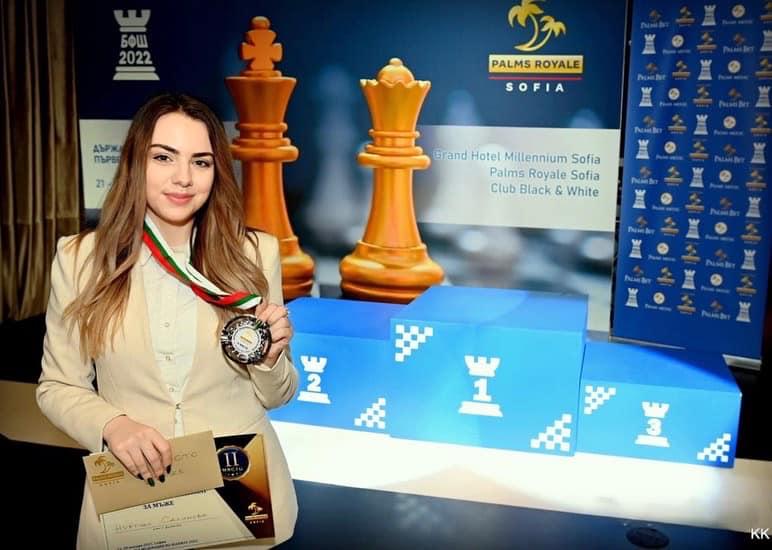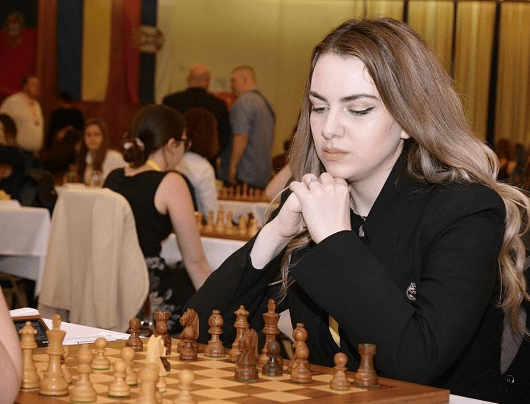
Rising Chess Star Emerges In Bulgaria: Under-20 Woman Almost Wins National Championship
IM Nurgyul Salimova of Bulgaria almost achieved the dream of every young woman chess player—she almost won her country’s national chess championship. In the 2023 Bulgarian Chess Championships, she ended half a point short of first place.
The nine-round Swiss tournament was held January 21-28, 2023 in Sofia, Bulgaria. If Salimova had won her final game, which ended in a draw after 42 moves, she would have finished in a tie for first place with the legendary GM Georgiev Kiril.

Although she tied for second place with two others (both GMs), Salimova was awarded the silver medal because her tiebreak points were higher. In the tournament, she finished ahead of six GMs and lost only to the champion. Learning about her chess journey helps to place her success in this tournament in perspective.
Rise Of Salimova As Chess Star
Salimova, who learned to play chess at the age of four, gained the world’s attention in 2011 when she won the European Chess Championship for girls under eight. The next year she won the World Youth Chess Championship and the European Union Youth Chess Championship, both for girls under 12.

In 2017, she won the Bulgarian Women’s Chess Championship and was invited the next year to play in Group C of Tata Steel. In 2018, when her rating climbed to 2352, she became number two among Bulgarian women and number two in the under-16 girls world rankings.
In 2019, she became a woman grandmaster at the age of 15 years 10 months. Less than three months later, she was awarded the international master title. In January 2022, she earned her first GM norm at Vergani Cup (January edition) where she scored 7-2, tied for first with three grandmasters, and defeated three grandmasters, including former world championship challenger GM Nigel Short. Here is her game against Short.
Striving For Gender Equity In Chess
Her victory over Short occurred only a few years after he had commented derisively in an interview with Time magazine about the ability of women to play chess: “It would be wonderful to see more girls playing chess, and at a higher level, but rather than fretting about inequality, perhaps we should just gracefully accept it as a fact.”
Short’s comments were countered in the same magazine by GM Judit Polgar, who famously responded: “We are capable of the same fight as any other man, and I think during the decades that I actively played chess I proved it as well. ... It’s not a matter of gender; it’s a matter of being smart.”
We are capable of the same fight. ... It’s not a matter of gender; it’s a matter of being smart.
—Judit Polgar
Polgar also told Time: “I grew up in what was a male-dominated sport, but my parents raised me and my sisters [to believe] that women are able to reach the same result as our male competitors if they get the right and the same possibilities.”

That mindset was clearly on display by Salimova in Sofia, where the tournament was held and fittingly the hometown of GM Antoaneta Stefanova, the ninth woman to reach the rank of grandmaster. The day after the tournament had concluded, she posted on Instagram: “I decided to compete with men and got silver medal!” She added: “I am happy with my games and results, and looking forward to represent Bulgaria at the European individual championship.”
I decided to compete with men and got silver medal!
—Nurgyul Salimova
Salimova’s defeat of a former world championship challenger a year earlier presaged her success in Sofia in the open section of her nation’s championships. Perhaps an earlier indicator of her ability to compete with men is her triumph in 2018 when she won the Bulgarian Blitz Championship in the boys’ section under 16.

Salimova’s connection to Polgar includes the Polgar Challenge, an elite online chess tour designed to support rising young players and advance gender equity in chess. Salimova was one of 10 girls who joined 10 boys in 2021, and they participated on gender-balanced teams, which might have been another precursor for Salimova to enter the open section of her country’s national championships.
Bulgarian Tournament
The chess traditions of Bulgaria are rich, such as how Stefanova, the Women's World Champion from 2004 to 2006, has represented Bulgaria in the Women's Chess Olympiad since 1992 and was also a member of the country’s team at the Chess Olympiad in 2000. Young chess players are inspired by the legacies of Stefanova as well as GM Veselin Topalov, a former world number-one who held the title of FIDE World Chess Champion.
The national championships are held annually, the open (traditionally referred to as the men's section) since 1933 and the women’s section since 1951. Although Salimova had previously competed in and won the women’s section, the 2023 tournament was her first venture into seeking gender equity in the open. In the event just concluded, the format was a nine-round Swiss; the time control was 90 minutes for a game, plus a 30-second increment starting on move one.

The table below summarizes Salimova's tournament experience round by round: who she faced, their title (if any), and their rating; the points that the opponent earned in the tournament, the color of pieces that Salimova had for the game; and the game result.
Round-By-Round Tournament Experience Of Salimova
| Round | Title | Name | Rating | Points | Color | Result |
| 1 | Kolev Lachezar | 2018 | 3 | White | 1 | |
| 2 | GM | Petkov Momchil | 2523 | 6 | White | ½ |
| 3 | GM | Rusev Krasimir | 2478 | 4 | Black | 1 |
| 4 | GM | Dimitrov Radoslav | 2501 | 5 | Black | 1 |
| 5 | GM | Georgiev Kiril | 2546 | 6.5 | White | 0 |
| 6 | GM | Nikolov Momchil | 2480 | 5.5 | Black | ½ |
| 7 | FM | Yordanov Lachezar | 2335 | 5 | White | 1 |
| 8 | GM | Spasov Vasil | 2499 | 5.5 | White | ½ |
| 9 | IM | Stoyanov Tsvetan | 2446 | 5.5 | Black | ½ |
In tournament games, among Salimova’s favorite openings are the Queen’s Pawn Game with the white pieces and Caro-Kann with black. That pattern held true for many games that she played in the tournament.
Her win in the first round with the white pieces against an untitled player was generally expected. In round two, she again had the white pieces in a game against the first GM that she faced, Momchil Petrov. After 45 moves, this game that had evolved into a rook and knight ending ended in a draw.
In rounds three and four, she had the black pieces against GM Rusev Krasimir and Dimitrov Radoslav, respectively. She won each game; both illustrate her prowess as Black. Her attack on the white king in game three is quite remarkable when she found the best move more than 62 percent of the time, compared to 50 percent for her opponent.
Round five featured the 19-year-old Salimova against the 57-year-old Kiril, a six-time national champion, and the outcome determined the eventual first-place winner. It was a battle of youthful energy vs. experienced wisdom, the new generation vs. the old guard, and resilient determination by both players.

Kiril, the number-one active player in Bulgaria, earned the grandmaster title in 1985, two years after being awarded the IM title for becoming the World Junior Champion. In 2019, Salimova was awarded the IM title. Positional errors by Salimova, powerful knight forks by Kiril, and the inevitable advance of his passed pawns doomed her chances at an upset victory.
Round six bought her third black game against a GM opponent. This time the game ended in a draw. After five straight games against GMs, she faced FM Yordanov Lachezar in round seven. With the white pieces, she made strong move after strong move and set social media on fire with her sharp play that resulted in her fourth win of the tournament.

Social media continued to buzz when she was in sole position of second place with two rounds remaining. Both rounds eight and nine ended in draws but preserved her spot to receive the silver medal.

Tournament Crosstable

The Future
What is ahead for the Bulgarian native? Fulfilling the remaining requirements for the GM title and fighting for her place on leaderboards are likely at the top of her list. She will also inherit increased responsibilities as a role model for younger players, both female and male.
Especially girls—who have long been inspired by legacy women players such as Polgar (and her sisters), GM Nona Gaprindashvili, Vera Menchik, and others (see the Chess.com list here)—will be looking to Salimova for renewed inspiration and motivation to compete against all players, regardless of gender. Please comment below if her career so far inspires you and what you think her future may hold.

All games of Salimova in the 2023 tournament are included below except for round one, which is not available.
All Games Of Salimova In Tournament
